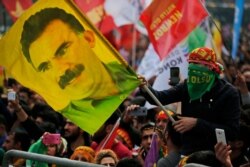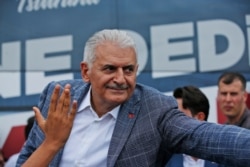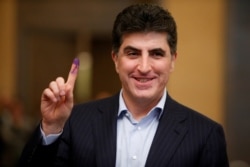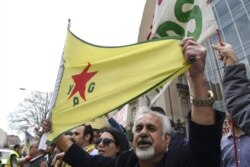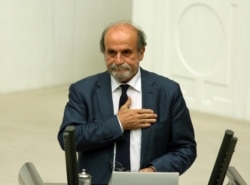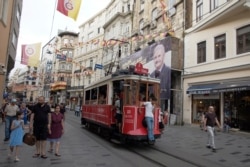In what is being seen as a last-minute bid to win Sunday's Istanbul mayoral election, Turkish President Recep Tayyip Erdogan is looking to an imprisoned Kurdish rebel leader in an effort to deny the opposition key Kurdish votes.
Jailed Kurdistan Workers' Party (PKK) leader Abdullah Ocalan, in a handwritten letter, called on Kurds to remain "neutral" in Sunday's vote.
"If the Kurds remain neutral, then the opposition candidate, [Ekrem] Imamoglu, will have difficulties in Sunday's vote," said international relations expert Huseyin Bagci of Ankara's Middle East Technical University.
Erdogan "has played his last and important card in the elections," he added. "I can imagine he promises another step in the peace process."
In 2015, peace talks collapsed between Ocalan's PKK and Ankara amid mutual recriminations, with ensuing fighting claiming thousands of lives, the destruction of many predominantly Kurdish town and city centers, and mass arrests of members of Turkey's legal pro-Kurdish HDP party.
The latest opinion polls indicate Erdogan's handpicked AKP candidate, Binali Yildirim, is heading again for defeat in Istanbul mayoral elections. The vote is being rerun after electoral authorities controversially ordered a rerun of March balloting because of the ineligibility of some polling officials.
In another move linked to this Sunday's poll, Nechivan Barzani, the newly elected president of semiautonomous Iraqi Kurdistan, was hosted in Istanbul by Erdogan, who described Barzani as a "special guest."
"Nechivan Barzani's visit is the last-ditch image to try to affect the outcome of the election," said former senior Turkish diplomat Aydin Selcen, who served in Iraqi Kurdistan.
"It's obvious to both sides the Kurdish vote is key to the outcome of the [Istanbul mayoral] election. Istanbul is the largest Kurdish city in the world. The Barzani visit will show to the public opinion that AKP and Erdogan have no problem with the Kurds, only with terrorists, and that is the dominant narrative of Erdogan," Selcen said.
It is Ocalan's intervention that is seen as the potential game changer in Sunday's polls.
"This is a hand grenade into the support of the HDP for the opposition [in Sunday's poll]," said political scientist Cengiz Aktar. "Despite being jailed for 20 years, against all the odds, despite everything, Ocalan still has an unchallenged symbolic value within the Kurdish political movement, be it in Turkey or Syria. He is still considered the historic leader of the Kurdish political movement, particularly in the two countries."
Some analysts suggest Ocalan's priority in any resumption of the peace process would be resolving tensions between Syrian Kurdish YPG forces and Ankara, which considers the militia as a PKK proxy. Such a move would be welcomed by Washington, which backs the YPG, a point of tension in Turkish-U.S. relations.
"There is a strong possibility of [Syrian Kurds] negotiating with Turkey with the brokerage of the United States," said Aktar. "This indeed could be an argument for Ocalan kind of warning not to get too engaged with the opposition, so not to put the regime in too much difficulty, which could cut its abilities to negotiate over Syria."
However, there has been strong pushback across the Kurdish movement against Ocalan's call on Kurds to be neutral in Sunday's vote.
"They should avoid voting for tyrants. A lesson must be given in Istanbul by making them [AKP] lose again," PKK leader Murat Karayilan said in an interview Thursday.
The HDP reaffirmed its commitment to back Imamoglu in Sunday's vote. "There is no change in the HDP's election strategy and tactical steps," party co-leaders Pervin Buldan and Sezai Temelli said in a joint statement.
The honorary HDP president, Ertugrul Kurkcu, argues that given the scale of the crackdown by Erdogan against the Kurdish movement, Kurdish voters will not be swayed in not voting against the AKP in Sunday's vote.
"The [Kurdish] voters in Istanbul, who are better educated, more deeply involved in political tactics and deeply urbanized, are more to the left of center, are not going to shift their positions for an impossible hope [peace talks with AKP]," said Kurkcu.
The outcome of Sunday's vote and how the Kurds vote are now seen as a watershed moment for the broader Kurdish movement.
"If Yildirm loses, there would be a new understanding of the HDP as a political party," said Bagci. "The HDP will be then much more in the eyes of the domestic politics as well as international observers much more free as a political party that doesn't listen to the ideological leader."
Control of Istanbul, Turkey's largest city accounting for more than a third of the country's industrial output and nearly half the taxes, is widely seen as the greatest political prize other than the presidency. But with both Erdogan and Ocalan putting their political prestige on the line, the repercussions of Sunday's poll are now seen to extend far beyond Istanbul.
"On Sunday, Ocalan's and Tayyip Erdogan's political charisma either will get stronger out of these elections or we will see their political charisma no longer has implications for domestic politics, and this will be the decline of Erdogan's AKP and Ocalan's PKK," said Bagci.





